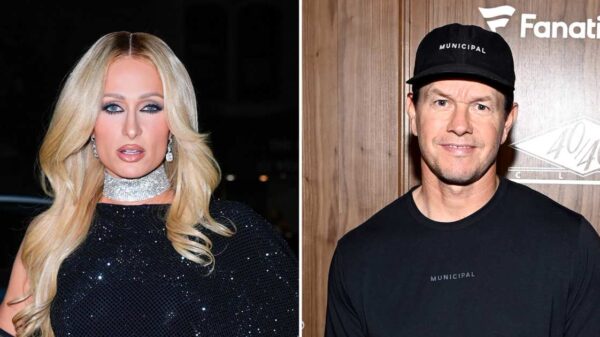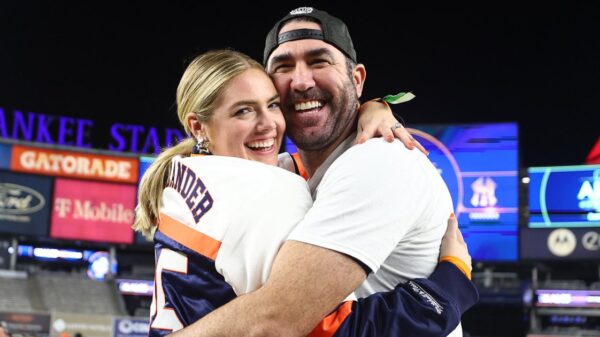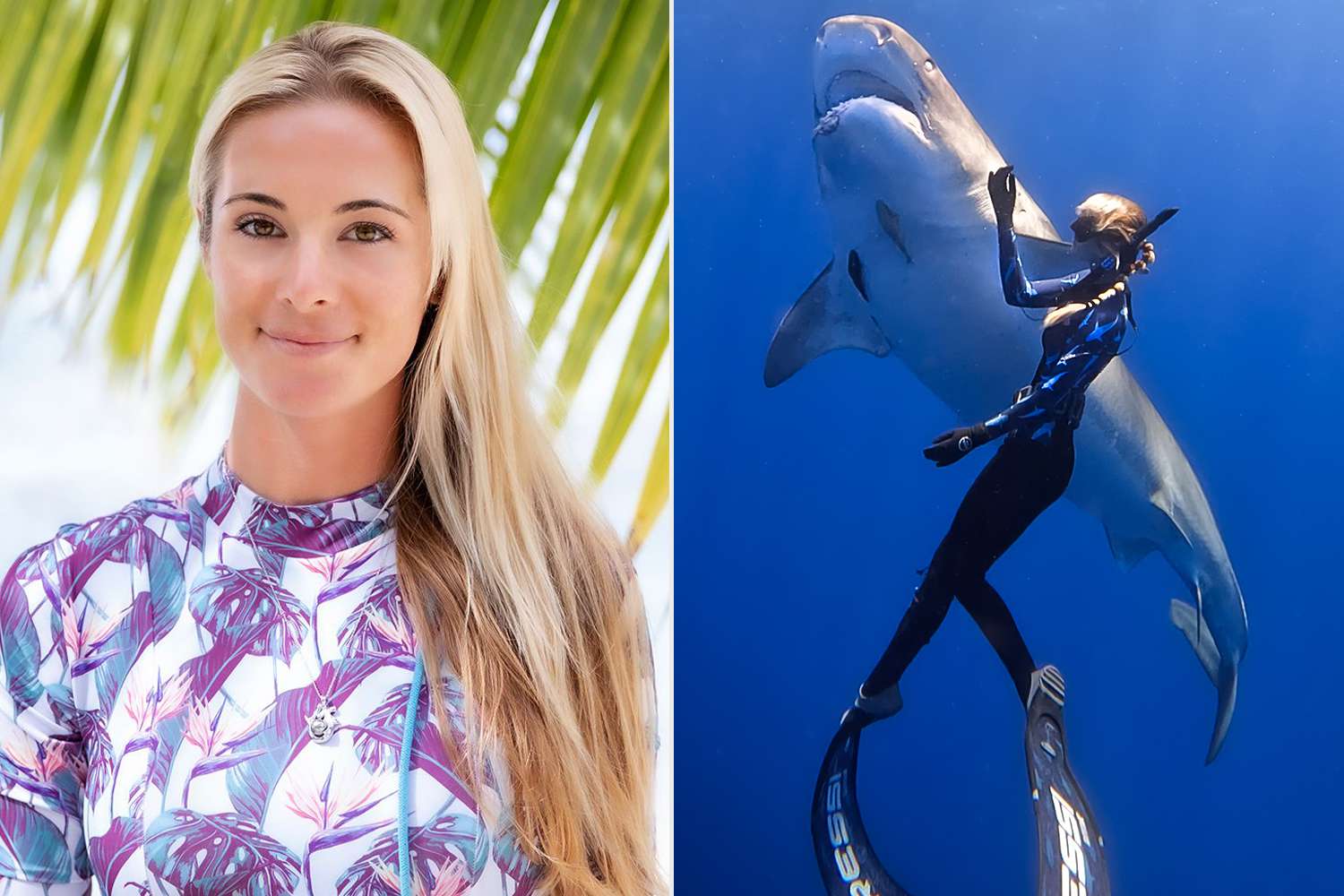NEED TO KNOW
- Ocean Ramsey spoke with PEOPLE exclusively about diving with sharks as a professional diver and conservationist
- The Hawaii native, who has been swimming with sharks for as long as she can remember, recalled learning “the hard way” in the beginning
- Ramsey shared tips on shark safety and what to do in emergency situations, which she’s learned from her own experiences swimming inches away from them by choice
While many would shudder in fear at the thought of swimming beneath the sea mere inches away from a great white shark, there’s one particular person who excitedly dives in head first in an attempt to turn the tide.
Her name is Ocean Ramsey, a professional shark diver and conservationist who’s based out of Oahu, Hawaii, and travels around the world to study the apex predators in the deep blue down below. What started as her passion evolved into a career for a cause.
“Speaking up for sharks,” the Hawaii native tells PEOPLE exclusively of the real reason she dives beneath the depths to engage with the sea’s misunderstood “monster,” despite the preconceived notion of them in part due to sensationalized shark attacks in the media.
Perhaps the “Jaws effect” is another reason why the big fish are feared given the phrase was coined in the wake of Steven Spielberg’s 1975 horror movie about a massive great white shark that terrorizes a beach resort town.
Ramsey, too, referenced the film while mentioning her dad’s love for scuba diving and recalling his observation after the shark-centric spectacle was released. “The next day the beaches were empty,” she says of her father’s account.
Given the incomprehensible thought of an empty beach on the island of Hawaii (and nationwide), surely the movie’s effect on viewers was impactful. Her dad’s fearless mindset, meanwhile, clearly had an impact on his daughter and influenced the way she views sharks today.
“He wasn’t afraid,” Ramsey says of her dad, who, along with her mother, a swimmer, taught her to “respect all living beings, regardless of species” as she grew up. “I was just a little nature child,” she adds, later citing her parents’ love for the ocean as the reason behind her birth name.
Naturally, diving with sharks is something Ramsey says she’s been doing for as long as she can remember. Her own love for the species, along with animals of all kinds, influenced her decision to study veterinary before realizing the job wasn’t for her.
“I switched and geared towards marine science,” the Hawaii native explains, though says “it wasn’t an academic path” that led to her shark career today. Rather, it was an approach that was natural and, well, more hands-on.
Ramsey says she had to learn on her own — or as she puts it, “the hard way” — when she first started diving with sharks, like “not to splash” and “be really quiet around them.” She explains, “Otherwise, they might rush you or they’ll give you more attention.”
That’s exactly what happened to the shark diver during one of her early dives and she had no choice but to “face the one that was coming the closest” to her. As a result, she turned to a self-defense tactic, one which isn’t violent and that she still uses today.
Ramsey calls it “redirecting,” which she developed from “literally being rushed” by a shark.
“Hand on top of the head, push down, lock out the elbows, stiff arm,” she explains of the process “to try and keep space” between the shark and a diver’s body. “Then, follow through off the side. Second hand goes on or near the behind the back of the jaw or by the gills,” she continues in part.
“That information is shared for emergency purposes only,” she’s sure to add, emphasizing that redirecting is a method that proves humans and sharks can “coexist.”
Ultimately, that’s at the heart of Ramsey’s passion project-turned-career.
“Part of shark conservation is… ultimately people don’t want to protect a monster,” she says. “And so a little bit of our program and the education I try to put out there is to dispel this sort of Jaws fictitious portrayal of them and really empower people with an ability to coexist.”
Killing sharks is not the answer, which Ramsey stressed over and over again throughout the interview. Sure they are predators, but they are important animals to our planet’s ecosystem, like helping to keep our ocean healthy and even playing a role in mitigating climate change.
Humans kill an estimated 100 million sharks every year, according to the International Fund for Animal Welfare. That’s an average of nearly 274,000 sharks every day, over 11,000 sharks every hour, and around three sharks every second.
In contrast to human-induced shark deaths, less than 10 people around the world are killed by shark attacks each year, the organization reports. Experts believe these deaths are often unintentional, and are sharks simply mistaking human kicks for fish splashes.
“So in order to allow sharks to exist, you have to teach the humans that they’re not monsters,” Ramsey tells PEOPLE. “They’re predators, but we need them to be predators — so all we need to do is adapt to their predatory role, behavior and nature.”
These are among the lessons Ramsey shares on her social media platforms, including her Instagram with over 2M followers and jaw-dropping shark interactions with hundreds of millions of views. Her content is breathtaking, hypnotizing — and yes, slightly frightening — but nonetheless beautiful.
When asked about the numerous headlines covering the recent study published in Frontiers in Conservation Science that suggests social media influencers are fueling the rise in shark attacks, Ramsey made clear that she posts for “education” purposes.
The content creator, who doubles as co-founder of One Ocean Diving, admits she’s “seen the comments” about people accusing her of posting for the “attention” and the “likes,” however, she defended her intentions.
“If I was just doing things for likes… I wouldn’t waste time running reef and beach cleanups and cutting fishing line off of sharks,” she says in part. “And I wouldn’t waste my time getting laws passed to protect them, or educating, or writing books, or going into schools and doing presentations.”
Again, Ramsey has been shark diving for as long as she can remember. She’s in the water seven days a week. “To me… it just feels like a connection to infinity,” she says of the emotions that consume her during her dives with the misunderstood creatures in the vast underwater world.
“It’s that open wilderness. You’re just seeing the beauty of the ocean alive in watching the movement of the sharks and it’s incredible to be in their presence,” she continues. “They have such a unique and commanding and beautiful presence that really just sort of naturally draws you in.”
“And then I have to train out of just getting locked in on one beautiful shark,” she adds with a laugh. “So you don’t want to ignore all the other beautiful sharks around you.”
Just thinking about her intimate dives with sharks, it’s easy to sense Ramsey’s connection to them — and her descriptions of her underwater experiences sound like dream sequences, ironic given her ultimate takeaway.
“For me,” she concludes, saying, “Being out in open ocean surrounded by sharks… there’s no point in my life where I feel more fully awake.”
Read the full article here










































